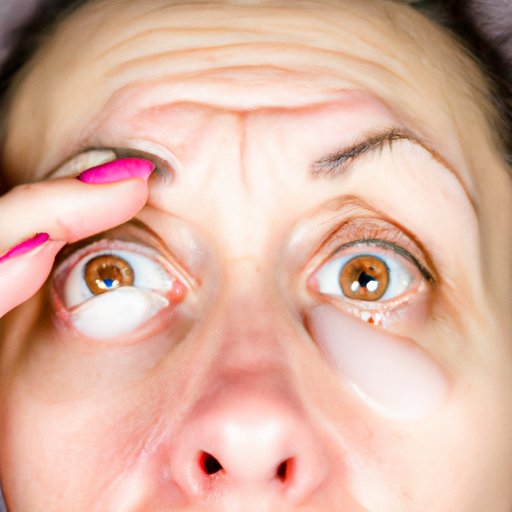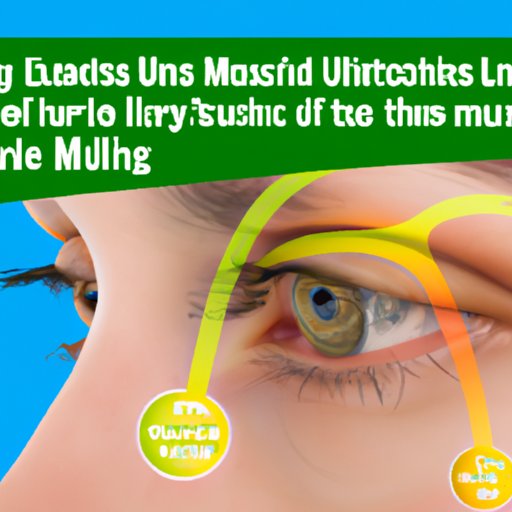
Introduction
Eye mucus is a sticky or crusty substance that forms when tears, oil, and dirt accumulate around the eyes. It can appear in the corners of the eyes or spread across the surface of the eye and eyelids. While some amount of eye discharge is normal, too much or abnormal discharge can indicate an underlying problem.
The most common symptoms of eye mucus include redness, itching, inflammation, and blurred vision. In severe cases, it can impair vision and cause discomfort, especially in the morning when the discharge becomes dry and crusty. It is important to treat eye mucus as it can lead to complications and other health conditions.
Identifying the Causes and Risks Associated with Eye Mucus
Eye mucus can be caused by a range of problems, including allergies and irritants, infections, dry eye syndrome, and eye injuries. Identifying the cause is crucial for effective treatment and preventing future occurrences.
Allergies and Irritants
Allergies and irritants are common causes of eye mucus. They can cause inflammation and redness, leading to an increase in eye discharge. Common irritants include pollen, dust, pet dander, cigarette smoke, perfume, and chemicals found in makeup and skincare products.
Infections
Infections, such as conjunctivitis, blepharitis, and corneal ulcers, can cause excessive eye mucus. Conjunctivitis, commonly known as pink eye, is caused by a viral or bacterial infection and is highly contagious.
Dry Eye
Dry eye syndrome occurs when the eyes do not produce enough tears or when the quality of tears is poor. This can cause an increase in eye mucus as the body tries to compensate for the lack of moisture in the eyes.
Eye Injuries
Eye injuries, such as a scratch to the cornea or foreign object in the eye, can cause excessive eye mucus. The discharge is a sign that the eye is trying to protect itself from further damage.
Untreated eye mucus can lead to complications such as vision problems, eye infections, and corneal ulcers. If you experience persistent symptoms of eye mucus, seek medical attention as soon as possible.
Home Remedies for Getting Rid of Eye Mucus Naturally
Home remedies can be effective in treating eye mucus and reducing the discomfort associated with it. These remedies include:
Warm Compresses
Applying a warm compress to your eyes can help loosen up the mucus and reduce inflammation. To do this, soak a clean cloth in warm water and place it over your closed eyelids for 10 to 15 minutes.
Gentle Eye Massage
Gentle massaging of the eyelids and the area around the eye can help stimulate tear production and reduce blockages in the oil glands. This can help relieve dry eye symptoms and reduce eye mucus.
Saline Solution
Saline solution can help flush out irritants and bacteria from the eyes, reducing eye mucus. To make a saline solution, mix 1 teaspoon of salt in a cup of warm water. Tilt your head back and use a dropper to put a few drops in your eyes.
Teabags
Tannic acid found in tea may help reduce inflammation and relieve eye mucus. To use, soak tea bags in warm water, then place them over your closed eyelids for 10-15 minutes. Repeat the procedure several times a day.
Healthy Diet
A balanced diet that includes sufficient amounts of vitamins A, C, and E can help maintain good eye health. Eat foods such as green leafy vegetables, citrus fruits, carrots, and fatty fish like salmon.
Medical Treatment Options to Combat Eye Mucus
If home remedies don’t work, it may be necessary to seek medical treatment. Treatment options include:
Over-the-Counter Eye Drops
Over-the-counter eye drops can help relieve dry eyes and reduce eye mucus. They come in different formulations such as artificial tears or antihistamine drops to treat allergies.
Prescription Eye Medication
If your eye mucus is caused by an underlying health condition, your doctor may prescribe a stronger medication, such as antibiotics, steroids, or immunosuppressants.
Surgical Intervention
In rare cases, surgical intervention may be required to treat eye mucus caused by a blocked tear duct, or in severe cases of dry eye syndrome and corneal ulcers.
Tips for Incorporating Proper Eye Hygiene into Your Daily Routine
Proper eye hygiene can help maintain good eye health and reduce eye mucus. Here are some simple steps to follow:
Washing Your Hands Frequently
Wash your hands before touching your eyes or applying eye drops.
Avoiding Touching Your Eyes
Try not to touch your eyes unnecessarily as this can introduce bacteria into your eyes.
Proper Contact Lens Care
If you wear contact lenses, follow proper hygiene and care guidelines to avoid eye infections and eye mucus.
For specific types of eye mucus, follow these guidelines:
- If you have sticky or crusty mucus on your eyelashes, gently clean them with a warm washcloth.
- If you have thick, yellow, or green mucus, consult with your doctor immediately as this may signal an infection.
- If your mucus is accompanied by severe pain, swelling, or vision changes, seek immediate medical attention.

Exploring the Link Between Underlying Health Conditions and Eye Mucus
Eye mucus can be a symptom of underlying health conditions such as
Conjunctivitis
Conjunctivitis, also known as pink eye, is a highly contagious infection of the conjunctiva, causing redness, itching, and eye discharge.
Blepharitis
Blepharitis is an inflammation of the eyelids, often caused by bacteria or a malfunction of the oil glands.
Sjogren’s Syndrome
Sjogren’s syndrome is an autoimmune disorder that can cause dry eyes and dry mouth. It can also lead to other health problems such as joint pain and fatigue.
Identifying and treating underlying health conditions can help reduce eye mucus and prevent complications. Consult with your doctor if you suspect that you have an underlying health issue.
Benefits of Seeking Professional Medical Advice for Persistent Eye Mucus
If your symptoms persist, it is essential to seek professional medical advice. An eye doctor can examine your eyes and determine the underlying cause of your eye mucus. They can prescribe appropriate medication or refer you to a specialist if necessary.
Strategies for Preventing Future Occurrences of Eye Mucus
To prevent future occurrences of eye mucus, follow these practical tips for eye health:
Simple Steps for Good Eye Hygiene
- Wash your hands frequently.
- Don’t rub your eyes unnecessarily.
- Avoid harsh chemicals near your eyes.
- Remove eye makeup before going to bed.
Preventing Health Conditions That Can Cause Eye Mucus
- Protect your eyes from irritants and allergies.
- If you wear contact lenses, follow proper care and hygiene guidelines.
- Protect your eyes from the sun’s harmful UV rays by wearing sunglasses.
- Eat a healthy diet that includes omega-3 fatty acids and antioxidants.
Conclusion
Eye mucus can be uncomfortable and a signal of underlying health conditions. However, home remedies and medical treatments can effectively reduce the symptoms and prevent complications. Practice good eye hygiene and seek professional medical advice if your symptoms persist. Always prioritize your eye health as it is essential for vision and overall wellbeing.




